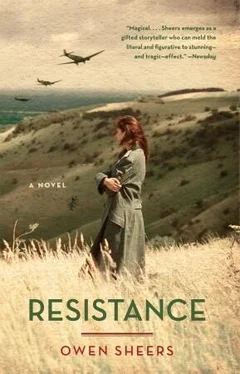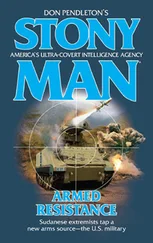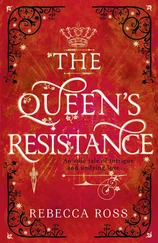He’d waited in line behind the other farmers at the freight desk the Germans had set up and eyed the guards on the station forecourt. They looked younger than him, thin. He hated them, he was sure of that. Atkins had been clear about what these men did in the name of fighting for their country. And the other man too, the man who’d visited George after Atkins, the man who’d never told him his name, he’d been at his most articulate when telling George what the occupying soldiers would do to him and his loved ones. Men castrated like male lambs. The young women “spread” among the elite officers. Yes, he hated them. And yet here, in the flesh, these young guards looked so normal, so human. They looked like the young Allied soldiers he’d seen retreating through this same station just the week before. Only the colour and cut of their uniforms were different. The dirt, dust, and the shabbiness of the material were all the same. Under those odd mushroom-shaped helmets, George saw how these guards were boys like him. He even noticed two of them share a joke, the language angular on his ear. They’d laughed. And then he’d hated them again. These boys playing at soldiers, laughing outside the station he’d known since he was a child.
At the head of the queue, a German officer stood beside the freight clerk, observing the showing of papers and the collection of goods. The white silk scarf about his neck was smudged with grime along its creases. When George handed his docket to the clerk, the officer took it and glanced over its details. “Ah, chickens,” he’d said in a delicately accented English as he passed the docket back to the clerk. “My wife keeps chickens.”
A poster was pasted to the wall beside the desk. As the clerk worked through his files and papers, George read the first few sentences.
Proclamation to the People of Britain
1. British territory occupied by German troops will be placed under military government.
2. Military commanders will issue decrees necessary for the protection of the troops and the maintenance of general law and order.
3. Troops will respect property and persons if the population behaves according to instructions.
4. British authorities may continue to function if they maintain a correct attitude.
The clerk was completing his paperwork. George scanned over the next directive, hoping to reach the end of the poster before he had to leave. But then number 6 stopped him in his tracks. He felt the blood drain from his face.
The officer gave George a curt smile and a short nod, indicating he could leave with his crate of chicks. As he carried the crate away from the station, the two young guards watched him pass. George looked straight ahead, fixing his eyes on the brow of the hill over which he’d walk home. One of them strolled a few paces behind him, then stopped. George heard the metallic snap of his steel-shod boots on the tarmac. When they stopped he thought maybe the soldier was raising his rifle, taking aim at the back of his head. A rush of fear rose through him. He felt vulnerable, exposed, as if an area the exact circumference of a bullet just above his neck had turned to liquid. He kept his eyes on the hill and carried on walking, the chicks bubbling away in the crate he held before him. Nothing happened, but still he didn’t look back until he was out of sight and only then did he put the crate down and rest beside a signpost at the edge of the road, his hands quivering on his thighs. The signpost was new, the soil at its base freshly turned. The Germans had put it there, replacing the one removed by the Home Office five years earlier. The Germans seemed to have thought of everything, even bringing their own signposts. What else had they come prepared for? George thought again of that poster at the station, its sixth directive, so definite, so abrupt in its translation:
6. All civilians are warned that if they undertake active operations against the German forces, they will be condemned to death inexorably.
Shrapnel damage to left wheel arch of staff car .
George checked over the details of his latest observation, then folded it three times into a chunky square of paper. Reaching under his bed he picked out one of the split tennis balls he kept there. Pressing each side of the ball, he opened the slit as he would the mouth of a sheep he was dosing and slipped the folded rice paper inside. Then he put the ball in a canvas rucksack and put the sack under his bed, ready to take out that night, once his parents were asleep and he could move safely under the cover of darkness to the drop point at the barn.
This had become his regular rhythm. A week after Atkins’s first visit four years ago, he’d met the Intelligence officer again. As he’d suggested, George had kept an eye on the drop points, and, sure enough, one evening there was a note from Atkins telling him to meet the next afternoon in the top ploughed field. It was another hot summer day and once again George saw Atkins’s fishing flies winking in the sun before he properly saw the man himself. As he stepped over the dry, crumbling ruts, he couldn’t help thinking that Atkins’s “cover” of a country fisherman didn’t hold up too well out here in the middle of a ploughed field. But he knew why he’d chosen to meet here. No one could possibly overhear them. The field was the farthest from the farmhouse and wasn’t overlooked by any other buildings.
Standing there in the middle of the field, Atkins tested George on the sheet of German insignia he’d given him on their first meeting. Holding it before him he alternated between asking George for the name of a unit attached to a certain insignia and asking him for the description of the colours of a particular unit. He watched him carefully all the time, his blue eyes keen over the edge of the illustrated sheet.
“Well done,” Atkins said when they’d finished. “Only one wrong. The 6th Engineers have a black, not a red cross at the centre. Not to worry, though, they’re all engineers, and that’s what matters.” Taking a matchbox from his waistcoat pocket, he struck a match then held it to the corner of the insignia sheet. George watched as the paper curled in the heat, as the flame caught and climbed towards Atkins’s hand like an animal reaching for the fingers of its feeder. The ashes fell to the ploughed earth and scattered over the young leaves of the potatoes growing at their feet.
“Shan’t be needing that anymore, shall we?” Atkins said, eyeing George again.
“No, Mr. Atkins, I suppose not,” George had replied, relieved he’d passed this first test. As it turned out they did need another sheet of insignia. Over the years since that meeting in the ploughed field, the war had moved on. Divisions had amalgamated, battalions were swallowed, and whole new armies formed from volunteers in the occupied countries. So a couple of months ago, George had found another note at the drop point from Atkins, this time accompanied with updated insignia details. That note was the last he’d heard from him. Ever since then there’d been silence. A hurried scribble, G, Afraid you’ll have to learn these on your own. Good luck! T. A ., and attached to it, the illustrated list of insignia, at least twice as long as the one he’d given George four years ago.
Heavy rain through the night and into this morning. The river is very high, over the stepping-stones. The stream flowing fast too. Washing a lot of earth with it .
Clear by this evening. A strong sunset. Maggie said it looked like the hills were on fire .
Finished the ditching today. I think this rain might have drowned it though .
Maggie said we’ll start bringing the lambing ewes down tomorrow as it looks about to set in cold. She had some more news off her radio. London is still ours but they have a lot of the south. Maggie says they’ve even changed the time down there. German Summer Time. And they’ll do the same if they come up here. I can’t really see how .
Читать дальше












